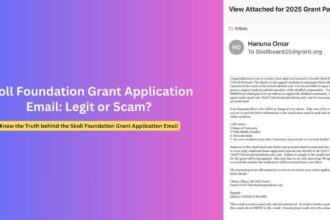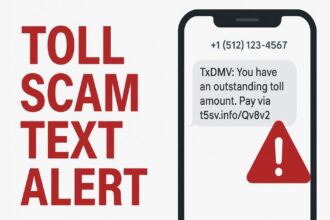A new wave of sophisticated recruitment scams is targeting UK job seekers, with fraudsters impersonating legitimate recruiting agency Gibson Hollyhomes through unsolicited text messages. The scheme has triggered a flurry of negative Google reviews from recipients who never engaged with the company, raising serious concerns about data protection and identity theft.
Security experts warn this operation mirrors similar scams impersonating other recruiting agencies like Yoh, suggesting an organized criminal network preying on vulnerable job seekers during uncertain economic times.
The Gibson Hollyhomes Impersonation Job Offer Scam
The scam begins with an unsolicited text message from someone identifying themselves as “Anna” from Gibson Hollyhomes, a legitimate recruitment agency with offices in Manchester and Leeds. According to recent Google reviews, recipients report receiving job offers despite never having contacted the company or shared their personal information.
“I’m fully retired and wasn’t interested, but they still persisted in trying to persuade me,” wrote one reviewer named Ian. “When asked how they obtained my contact number as I’ve never had any dealings with this company before, they replied that they had obtained it from a data centre.”
This response about obtaining numbers from a “data centre” raises immediate red flags about potential GDPR violations, as UK law requires explicit consent for such communications.
Most concerning is the scammers’ persistence. Multiple reviewers report that after blocking the initial number, they receive identical messages from different phone numbers, suggesting an organized operation with access to multiple communication channels.
“Blocked Anna only to have her txt the exact same message from a different number,” reported Paul Taylor in his Google review. “Reeks of desperation and shady practices.”
The Broader Recruitment Scam Landscape
The Gibson Hollyhomes impersonation scam follows a pattern seen across the UK recruitment sector. Similar schemes have targeted job seekers by fraudulently using the identities of established agencies such as Yoh, Day & Zimmermann, and others.
Dr. Marcus Chen, cybersecurity analyst at the National Cyber Security Centre, explains: “These operations are sophisticated social engineering attacks. They leverage the credibility of established brands while exploiting the vulnerabilities of people seeking employment.”
The timing is strategic. With economic uncertainty increasing job market competition, scammers capitalize on the desperation of those seeking employment, knowing that people are more likely to overlook red flags when presented with promising opportunities.
What differentiates the Gibson Hollyhomes impersonation is the consistent identity of “Anna” across multiple reports, suggesting a more targeted approach than the mass-messaging campaigns seen with other recruitment scams.
Overview of the Anna’s Scam Text from Gibson Hollyhomes
Based on recipient reports, the fraudulent text messages share several consistent characteristics:
- Initial Contact: Unsolicited text from “Anna” claiming to represent Gibson Hollyhomes
- Targeting: Messages sent to individuals across different industries and employment statuses (including retired persons)
- Persistence: Follow-up from alternative numbers if the recipient blocks the initial contact
- Evasiveness: Vague or misleading answers when questioned about data sources
- Inappropriate Targeting: Job offers sent to individuals clearly unsuitable for recruitment (retirees, individuals in unrelated industries)
While the initial messages appear designed to establish contact rather than immediately defraud recipients, they follow the established pattern of recruitment scams that eventually progress to requests for personal information, payments for “training” or “equipment,” or identity theft.
“The initial message is just the foot in the door,” explains former Metropolitan Police cyber fraud investigator Sarah Williams. “The real fraud happens several steps into the conversation, after trust has been established.”
Red Flags: How to Identify Fraudulent Job Offers
Security experts have identified several warning signs that distinguish legitimate recruitment communications from scams:
Communication Methods
- Unsolicited Contact: Legitimate recruiters typically respond to applications or LinkedIn profiles rather than sending random texts
- Personal Numbers: Professional recruiters use company phone systems or email, not personal mobile numbers
- Platform Switching: Requests to move conversations to WhatsApp or Telegram instead of professional channels
- Multiple Numbers: Using different phone numbers after being blocked is a classic scammer tactic
Message Content
- Generic Offerings: Vague job descriptions that could apply to anyone
- Too Good to Be True: Exceptionally high pay for minimal qualifications or work
- Improper Targeting: Job offers unrelated to your skills, experience, or employment status
- Poor Grammar/Formatting: Though not always present, many scams contain linguistic errors
Process Issues
- Data Source Evasion: Inability to explain clearly how they obtained your contact information
- GDPR Violations: In the UK, claiming to use data without consent is an immediate red flag
- Pressure Tactics: Creating artificial urgency to respond or make decisions
- Payment Requests: Any requirement to pay for applications, training, or equipment
“Legitimate recruiters have specific positions to fill and target candidates with relevant skills,” notes Emma Davidson, Director of the Recruitment & Employment Federation. “Random, untargeted outreach is almost always a sign of fraudulent activity.”
The Impact: Beyond Individual Victims
The consequences of these scams extend far beyond the immediate targets. Legitimate recruiting firms like Gibson Hollyhomes suffer reputational damage when their identities are misappropriated for fraudulent purposes.
The flood of negative Google reviews demonstrates this collateral damage. The actual Gibson Hollyhomes agency—which describes itself as delivering “a professional and consistent recruitment service”—now faces trust issues due to activities they likely have no connection with.
For the broader recruitment industry, these scams create an atmosphere of suspicion that makes genuine recruitment more challenging. Job seekers become hesitant to engage with legitimate opportunities, fearing they might be scams.
“These fraudsters poison the well for everyone,” says recruitment specialist Thomas Grant. “They make it harder for legitimate agencies to connect with candidates and for genuine job seekers to trust outreach from recruiters they don’t know.”
How to Protect Yourself from Recruitment Scams
To avoid falling victim to recruitment scams, security experts recommend the following precautions:
Immediate Response to the Gibson Hollyhomes’ Suspicious Messages
- Do not respond to unsolicited text messages about job opportunities
- Block and report the number immediately
- Never click links in unexpected recruitment messages
- Do not share personal information via text message or WhatsApp
Verification Steps
- Contact companies directly through their official website or LinkedIn page
- Check Google reviews for patterns of similar complaints
- Verify recruiters on LinkedIn, confirming their employment history and connections
- Request official email communication from company domains only
If You’ve Engaged with Potential Scammers
- Cease all communication immediately
- Report the incident to Action Fraud (0300 123 2040)
- Alert your bank if you’ve shared financial information
- Monitor your credit report for unusual activity
- Report the impersonation to the legitimate company being misrepresented
“The most effective protection is verification through official channels,” advises cybersecurity expert Paul Johnson. “Never proceed with a recruitment process that began with an unsolicited text until you’ve independently confirmed the legitimacy of the opportunity.”
The Legal Response and Company Actions
The Information Commissioner’s Office (ICO) treats recruitment scams involving personal data as serious violations of data protection regulations. Under UK GDPR, organizations must have a lawful basis for processing personal data, including having clear consent before sending marketing communications.
Companies impersonated by scammers are encouraged to take proactive steps:
- Issue public warnings on their websites and social media
- Create dedicated reporting channels for potential scam victims
- Work with authorities to investigate impersonation cases
- Implement verification systems for their legitimate recruiters
Gibson Hollyhomes and other legitimate agencies can protect their reputations by clearly distinguishing their actual recruitment practices from the fraudulent activities being conducted in their name.
Looking Forward: The Evolving Threat
As awareness of these scams increases, experts predict the tactics will evolve. Future iterations may involve more sophisticated approaches, including:
- Deepfake video interviews imitating actual recruiters
- AI-generated personalized messages targeting specific career backgrounds
- Exploitation of legitimate job board data breaches
- Integration with phishing campaigns targeting corporate networks
“The technological sophistication of these scams is advancing rapidly,” warns Dr. Chen from the National Cyber Security Centre. “What begins as a simple text message scam today could evolve into much more convincing fraud tomorrow.”
For job seekers, maintaining healthy skepticism while still pursuing opportunities remains the challenge. By understanding the patterns of recruitment scams and implementing proper verification protocols, individuals can protect themselves while continuing their job search.
Remember: legitimate recruiters welcome verification and understand the caution job seekers must exercise in today’s environment. Any resistance to verification or insistence on unusual communication channels should be considered an immediate warning sign.
As the job market continues to evolve, staying informed about the latest scam tactics will remain essential for both job seekers and legitimate recruitment professionals working to connect talent with opportunity in an increasingly complex digital landscape.






































